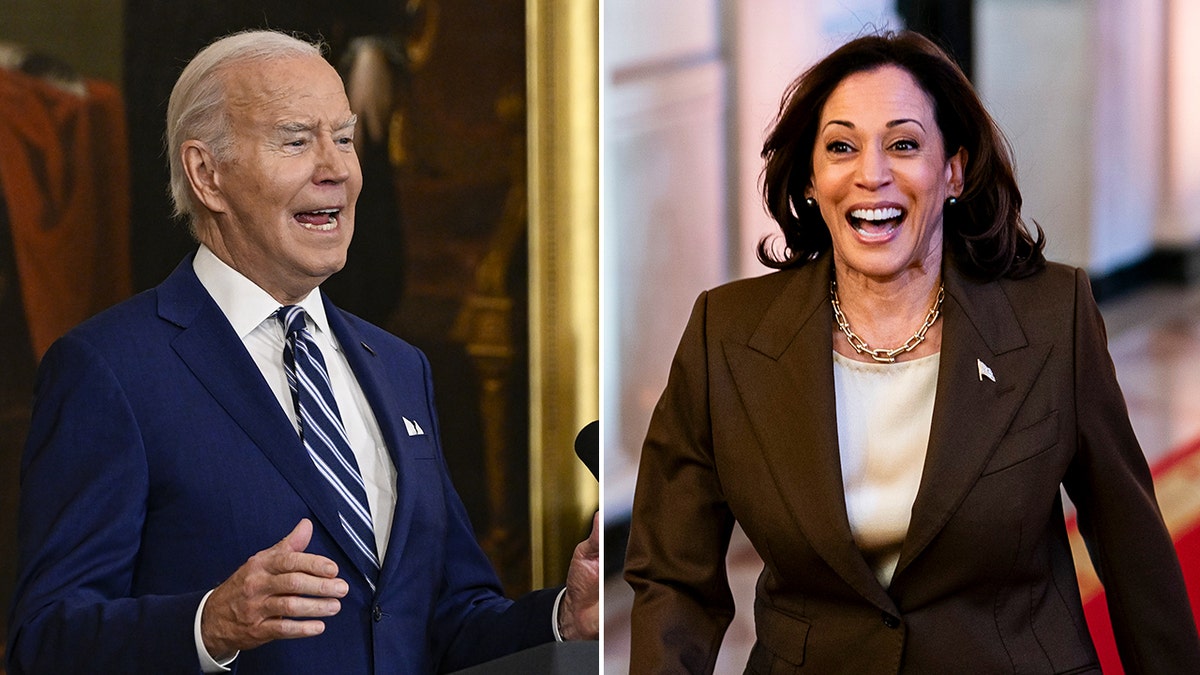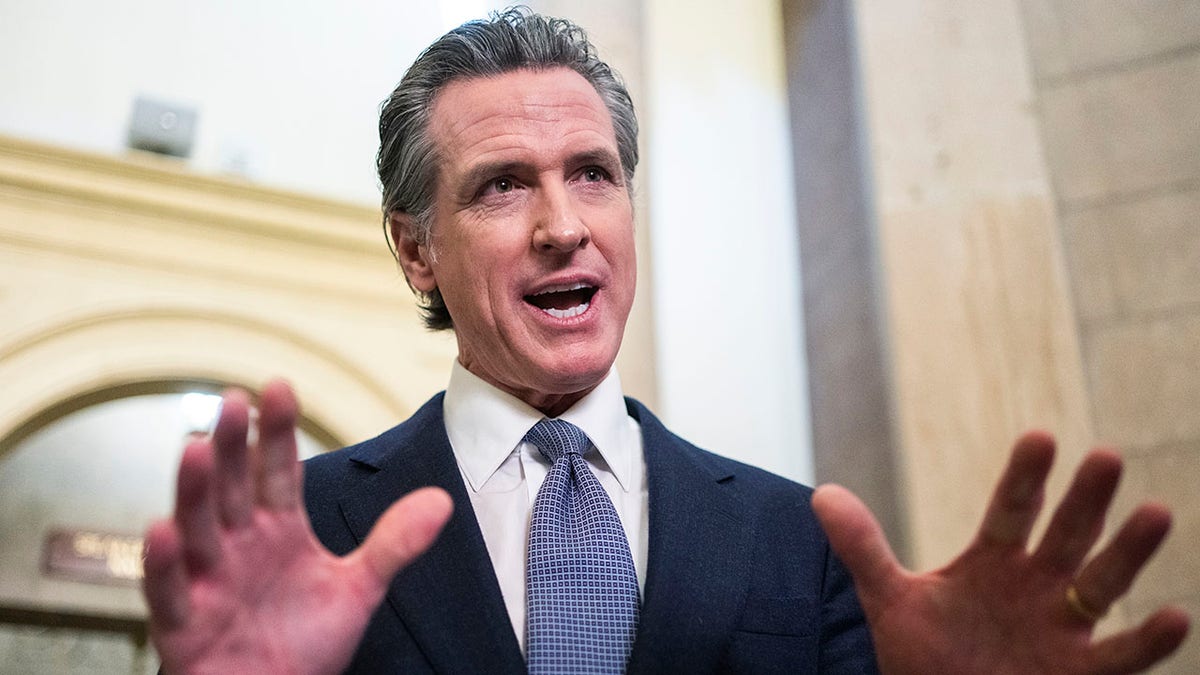New York Times op-ed warns voters won't consider Trump to be 'riskier' than Biden
The 'Outnumbered' panel discusses a New York Times opinion essay saying voters could see Biden as a riskier option than Trump in 2024.
It is becoming increasingly clear that President Joe Biden should not be the Democratic nominee for president in 2024.
Most recent public polls show Biden losing to former President Donald Trump in a general election matchup. In the latest CNBC poll, Biden trails Trump by six points, 48% to 42%. This should unnerve Democrats, especially given that Biden led Trump by about 10 points in December 2019, 11 months before narrowly winning the 2020 election.
There are striking similarities between Biden and former President Jimmy Carter, the last Democratic president to lose re-election. For one, Biden’s year-end approval rating (39%) is almost identical to what Carter’s (37%) was in December 1979, the year before he lost in a landslide to Ronald Reagan.
BIDEN APPROVAL RATING NUMBERS DISMAL COMPARED TO PREVIOUS MODERN PRESIDENTS, GALLUP FINDS
Moreover, Biden’s first term – much like Carter’s – has been defined by economic pessimism, a migrant crisis and unrest overseas: the withdrawal from Afghanistan, Russia’s invasion of Ukraine, and now the Israel-Hamas war.

President Biden's age is a big issue with potential voters. He fell on stage during the U.S. Air Force Academy graduation ceremony at Falcon Stadium, June 1, 2023, in Colorado Springs, Colorado. (AP Photo/Andrew Harnik)
And to be sure, Biden badly trails Trump on these major issues – by 21 points on the economy, 23 points on border security, and 11 points on the Israel-Hamas war, according to a recent Marquette University poll.
Notably, Biden is losing ground with the core of the Democratic base – young, liberal voters and non-White voters – in a way that is reminiscent of the challenges Carter faced during his re-election campaign. A recent New York Times/Siena College poll in swing-states shows a substantial erosion in support for Biden among African American, Latino and younger voters.
According to the latest AP-NORC poll, just 50% of African Americans approve of the president, down from 86% in July 2021.
Opposition to Biden’s handing of the Israel-Hamas conflict has been a major flashpoint. Three-quarters of voters ages 18-29 disapprove of how Biden has handled the conflict, according to the most recent New York Times/Siena College poll.
It is crucial to note that Biden is contending with a number of personal issues that even Carter did not. The legal problems facing the president and his son continue to metastasize, and House Republicans are inching toward an impeachment inquiry.
But arguably the most considerable personal challenge facing Biden is his age. At 81 years old, Americans have serious doubts about Biden’s abilities, and three-quarters (74%) say he is too old to run for a second term, per ABC News-Washington Post polling.
Many Democrats have privately – or in some cases, publicly – expressed anxiety that Biden’s age and perceived lack of viability could cost the party the White House.
One of the most prominent Democrats to openly question whether Biden is too old to run for a second term is former Obama chief strategist David Axelrod, which led to the president reportedly calling Axelrod "a p----," serving to tamp down any further public questioning.
"He thinks he can cheat nature here and it’s really risky," Axelrod told The New York Times’ Maureen Dowd.
Former Democratic Sen. Dennis DeConcini has echoed Axelrod’s concerns, telling NBC that Biden is "too old" to run. And of course, there is Minnesota Democrat Rep. Dean Phillips, who is pursuing a long-shot presidential campaign against Biden based on this very premise.
Behind the scenes, prominent Biden-Harris donors and allies are reportedly expressing similar concerns, something MSNBC pundit Joe Scarborough recently alluded to on air.
This wariness toward Biden’s re-election prospects is not new among Democrats. Indeed, dozens of party officials and members of Congress expressed doubts about the president’s viability in the summer of 2022, according to a report by The New York Times.

President Biden's logical replacement would be Vice President Kamala Harris, but she polls even worse than Biden. (Getty Images)
Given the power of the White House and the presidency, it is not surprising that most doubters – with a few notable exceptions – have been unwilling to go on record or say the quiet part out loud.
Still, the once-unlikely possibility we raised in the Wall Street Journal in May – that Biden will not seek re-election for a variety of reasons – is clearly becoming a more serious, or at least more desirable, prospect. But we, like many other Democrats, continue to wonder: if not Biden, then who should be the nominee?
Vice President Kamala Harris is still the most obvious choice, at least logistically and legally, and Biden’s prominent African American backers – led by South Carolina Democrat Rep. Jim Clyburn – would certainly push for her nomination.
But Harris is problematic. Despite the White House’s efforts to improve her public standing, she continues to poll behind the president. An NBC News poll taken in November found Harris with a dismal 29% favorability rating, compared to Biden’s 36%. Worse yet, she trails Trump in a hypothetical general election matchup by 12 points (52% to 40%).
Given her deep unpopularity, having Harris at the top of the ticket would not only cost Democrats the White House, but could also imperil down-ballot candidates, jeopardize control of the Senate and squander the possibility of winning the House.
To be sure, there would be a thicket of legal obstacles for Democrats to overcome if they opened up the nominating process at this late date, but the prospect of a broad-based defeat is almost certain to lead the party to do everything possible to find a nominee other than the sitting vice president.
Without a doubt, we continue to believe that the strongest – albeit, least likely – potential candidate is former first lady Michelle Obama, who left office with a 72% favorable rating and universal popularity among African Americans and Democrats.
Not only does Mrs. Obama handily defeat Biden in a hypothetical two-way Democratic primary (48% to 36%), she also leads Trump in a general election matchup (46% to 45%), according to polling by The Center Square.

California Gov. Gavin Newsom might be the best option for Democrats if President Biden drops out of the 2024 race. (Tom Williams/CQ-Roll Call, Inc via Getty Images)
Michelle Obama’s influence, popularity, and ability to inspire the core of the Democratic Party would make her a force to be reckoned with, though the chances of her seeking office remain low.
The second possibility, who we have touted before, is Hillary Clinton. The formidable former senator and secretary of state has a robust political machine, has been outspoken in her support of Israel, is unafraid to attack Trump, and has backed more moderate policies than most Democrats. That said, polling indicates that she could struggle in a primary, not to mention that she endured a painful loss in 2016 to the Republican she would most likely face.
There is one Democrat who has emerged as both a more likely and more viable candidate over these last few months: California Democrat Gov. Gavin Newsom.
By facing Florida Republican Gov. Ron DeSantis in a debate moderated by Fox News’ Sean Hannity, Newsom accomplished in one hour what no national Democrat has been able to thus far: offer a full-throated defense of Democratic policies in an otherwise politically unfavorable environment, while also toeing the centrist line in necessary respects.
Newsom was particularly articulate on the economy. Sitting opposite the governor of a state with no income tax, Newsom unabashedly defended his state’s controversial progressive tax system. He also articulated Biden’s central case on the economy in a way that the president has failed to, underscoring that slowing inflation and the strong job market are a byproduct of Democratic policies.
CLICK HERE FOR MORE FOX NEWS OPINION
Critically, Newsom pushed back on controversial Republican social policies – i.e., abortion, book bans and guns – while toeing the centrist line on issues that have plagued Democrats, i.e., parental involvement in schools.
In another key exchange, Newsom acknowledged the need for stricter border control policies, while also making clear that Republicans are trying to "play politics" by holding up Biden’s $14 billion request for border funding.
Many Democrats have privately – or in some cases, publicly – expressed anxiety that Biden’s age and perceived lack of viability could cost the party the White House.
On foreign policy, Newsom presented himself as distinctly tougher than both Biden and Harris, particularly with respect to the Israel-Hamas war. Biden has been criticized for ostensibly softening his support for Israel, while Harris more forcefully urged restraint by Israel this weekend.
CLICK HERE TO GET THE FOX NEWS APP
While national polling on Newsom is scant, the data there is indicates that he would be a formidable candidate. A Fox News poll conducted prior to the debate shows him trailing Trump by only four points, the same margin as Biden, which is within the margin of error. That Newsom polls this well, despite having barely entered the national arena and having never been president or vice president, is telling.
To be clear, it would be premature to rule out the possibility of Biden seeking a second term. But should the president make the decision to bow out of the race à la Lyndon Johnson in 1968, rather than suffering the fate of Jimmy Carter in 1980, two old faces and one new face will surge to the top of the list of potential nominees.
Andrew Stein is a former New York City Council president, former Manhattan borough president and former New York state Assembly member.














































